Our University Strategy is built on Creating a Better & more Sustainable Future for All
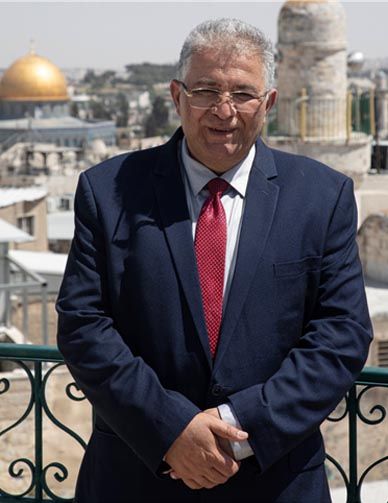
For more than four decades, Al-Quds University has thrived and grown under the most challenging of circumstances. Although we operate under military occupation and in a resource-poor environment, I am proud of the spirit of problem-solving and innovation that has allowed us to send our thousands of graduates into Palestine and the broader world as creative, forward-thinking, and talented professionals. Yet we also recognize that excellence demands more than innovation and improvisation. Excellence involves vision, planning, and the imagining of a more positive future. Accordingly, I have asked the leaders of our academic community to work together to plan collectively and effectively for the next phase of development and growth of Al-Quds University.
This Strategy, the product of this collective effort, is a living document meant to guide the leadership’s decision-making and to serve as a marker for assessing the extent and depth of our forecasted successes. Even more so, it is for ALL of us at the university – administrators, faculty, staff, and students. The ideas here reflect our core values of commitment to excellence in education, depth of research, and service to our community. These ideas bind us together as a community to address our most vital issues.
Al-Quds University will continue to be inventive and flexible in its methods, as we must be under such uncertain circumstances.
Yet our core values and goals will remain consistent, as we strive, not only to provide excellence in education and to produce new knowledge, but also to be a model of the kind of institution on which the future of Palestine can be built. This Strategy is the promise of Al-Quds University to address the needs and enhance all dimensions of the quality of life of Jerusalem and more widely of Palestine, primarily education, health, rights, and the economy.
Prof. Imad Abu Kishek
President
Al-Quds University established in 1977. It remains the only Arab university in the city of Jerusalem.
This six-year Strategy outlines the university’s commitment to aligning its mission, vision, and operations with the United Nations Sustainable Development Goals (SDGs) and fostering a culture of innovation and social responsibility. By embedding the SDGs into all aspects of university life, we aim to create a sustainable, inclusive, and socially responsible environment that prepares students, staff, and the broader community for a more equitable future in Palestine.
The plan begins with a comprehensive review and realignment of the University’s vision and mission to reflect the core principles of sustainability, inclusivity, and social responsibility. The vision guides us to be a leader in sustainable education, research, and community engagement at global standards. The Strategy systematically integrates the SDGs into all aspects of university life and operations. Similarly, the Goals and Objectives have been developed with social responsibility and sustainability at the forefront, thus integrating them into academic programs, research, and innovation.Furthermore, the actions and initiatives identified foster a culture of social responsibility among all University faculty, staff and students, together with local communities.
A fundamental approach taken in the Strategy is that the university will actively collaborate with local and global partners to address pressing social and environmental challenges.
Regular assessments and feedback mechanisms will be put in place to monitor the progress of the actions outlined in this Strategy. This will ensure that the University remains on track, continually adapts, and expands its global reach.
This Strategy plan embodies the university›s dedication to playing a significant role in advancing the SDGs and promoting social responsibility for the Palestinian community in and around Jerusalem. By embedding sustainability in every aspect of our institution, we aim to inspire a new generation of leaders committed to creating a better and more equitable community. By 2023, we envision the university as a beacon of sustainability and social responsibility, recognized globally for its transformative impact on individuals and society as a whole. Together, we will forge a path towards a better and more sustainable future.
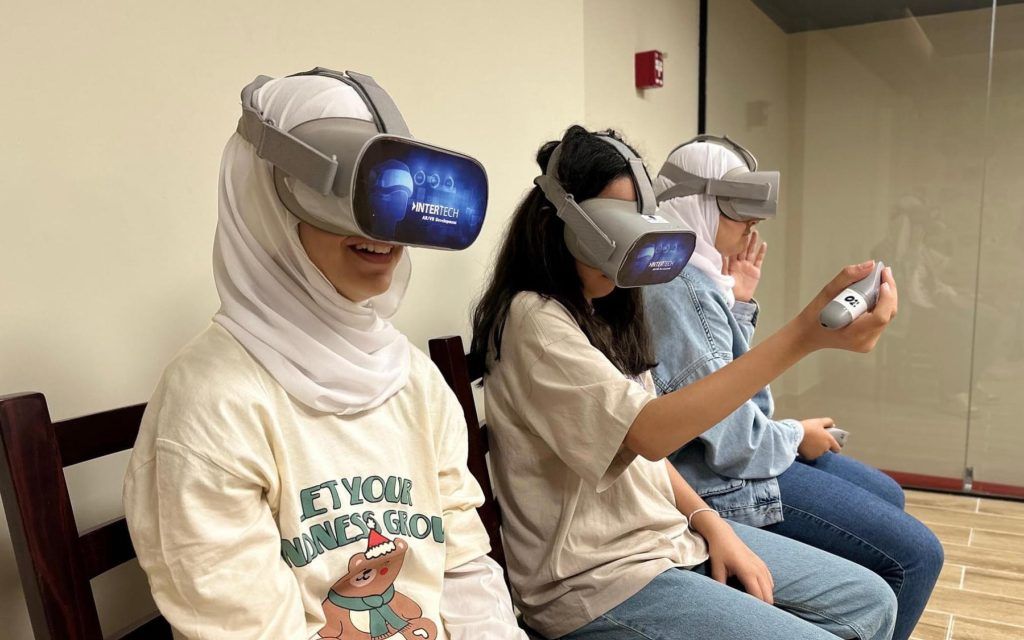
Al-Quds University (AQU) is a distinguished interdisciplinary academic and research-oriented Higher Education Institution dedicated to providing students with an engaging learning environment and a supportive campus culture. AQU remains the only Arab university in the City of Jerusalem since its establishment in 1977.
As a thriving academic center, our university offers top-quality education to individuals from all backgrounds and fields. Our fifteen faculties cover a broad range of disciplines, from medicine and health sciences to arts and humanities. Within these faculties, AQU offers 66 undergraduate degrees and 51 graduate degrees to its twelve thousand students. Thus, AQU offers professional, academic, and personal growth to all through its wide variety of academic programs.
AQU strives for excellence. Accordingly, we have over 700 expert faculty members each in their particular field, international partnerships with global universities, and are increasingly engaged in innovation and pioneering research worldwide.
At AQU, we seek to place University Social Responsibility and the Sustainable Development of the Palestinian people at the core of our values. Thus,
we are devoted to serving the local communities through our community engagement centers, numerous development projects, and by supporting marginalized persons in and around Jerusalem. We believe that education should be attainable for everyone; for this reason, we maintain the largest financial aid program among Palestinian universities as our Students Financial Aid Unit offers a wide range of grants and scholarships.
Notably, we are devoted to the success of our students not only in the academic field, but through a holistic approach to education, including recreation, research, innovation, entrepreneurship, sports, and work-based learning. AQU’s infrastructure encloses facilities such as a sports center, a business incubator, and research labs. Through the incorporation of technology-centered learning, we are creating the proper environment for students and staff to grow, excel, engage, and create. At AQU, we are not merely an institution of learning; we are a driving force of progress, committed to shaping the future through education, research, and industry linkages.

Al-Quds University (AQU) is a distinguished interdisciplinary academic and research-oriented Higher Education Institution dedicated to providing students with an engaging learning environment and a supportive campus culture. AQU remains the only Arab university in the City of Jerusalem since its establishment in 1977.
As a thriving academic center, our university offers top-quality education to individuals from all backgrounds and fields. Our fifteen faculties cover a broad range of disciplines, from medicine and health sciences to arts and humanities. Within these faculties, AQU offers 66 undergraduate degrees and 51 graduate degrees to its twelve thousand students. Thus, AQU offers professional, academic, and personal growth to all through its wide variety of academic programs.
AQU strives for excellence. Accordingly, we have over 700 expert faculty members each in their particular field, international partnerships with global universities, and are increasingly engaged in innovation and pioneering research worldwide.
In the 21st century, universities play a crucial role in shaping society and preparing future leaders who are equipped to address complex local and global challenges. One of these challenges is the urgent need to achieve sustainable development, as highlighted by the United Nations’ Sustainable Development Goals (SDGs).Al-Quds University (AQU) seeks to adapt to and incorporate trending global practices into its Strategy to maintain competitiveness and relevance in today’s globalized world. Staying informed and acting on best patterns and emerging global trends enables the university to remain at the lead and provide students with the necessary knowledge and skills demanded by today’s dynamic labor markets.
Recognizing this, incorporating the SDGs and sustainable practices within AQU’s strategic plan will strengthen its institutional commitment to forward-thinking methods and global standards that can develop well-rounded graduates capable of addressing societal challenges in and around Jerusalem.
Furthermore, climate change and its accompanying adverse impact have become increasingly visible and alarming worldwide, and Palestine is no exception. The accelerated human-induced effects of climate change necessitate immediate structural and behavioral changes across various sectors, including education. Universities bear a responsibility to take the lead in promoting environmental sustainability by reducing their carbon footprint, integrating green practices, and educating students on the importance of sustainable development. By explicitly acknowledging and providing actionable initiatives toward environmental sustainability within our Strategy Plan, AQU demonstrates its dedication to working with the Global Community to preserve the planet for future generations.
In like manner, evolving societal expectations demand that institutions not only strive for academic excellence but also embrace their social responsibility. Recognizing this, AQU seeks to align its strategy with community needs and address pressing social issues in and around Jerusalem. By incorporating social responsibility into its strategic plan, the university can actively contribute to the betterment of society, fostering partnerships with local communities, and creating opportunities for students to engage in service-learning initiatives. Notably, a sense of responsibility reflects positively on the university’s reputation and standing, thus attracting talented students, faculty, and collaborations.
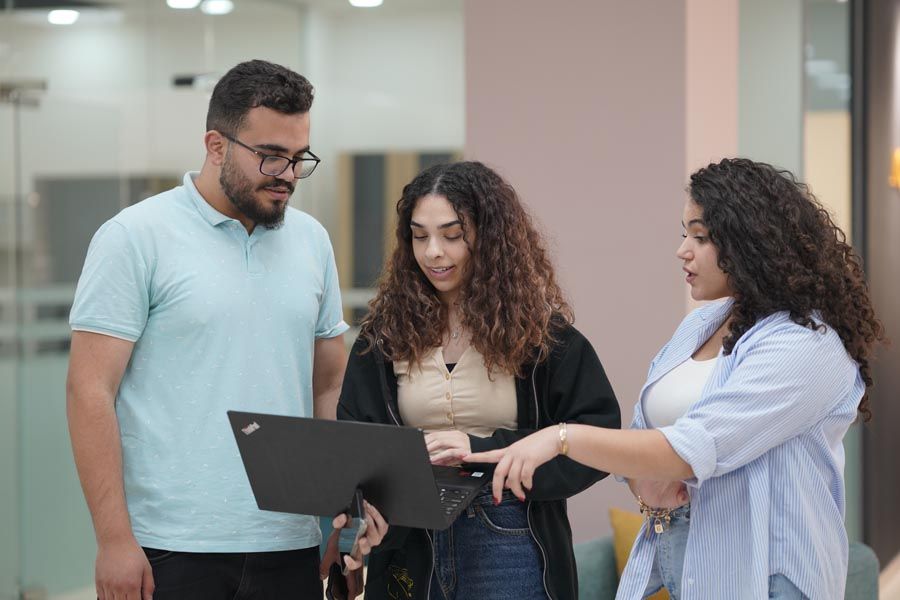
The Strategy is based on a comprehensive analysis of the internal and external factors that affect our operations and strategic direction, including trends in higher education, socio-economic conditions in and around Jerusalem, and technological advancements. The strategic planning process has consisted of a hybrid top-down and bottom-up approach seeking, not only engage decision-makers at the university level, but also to ensure a participatory approach that increases the confidence and sense of belonging and ownership among all stakeholders. In this manner, the process has been guided by a comprehensive assessment of the university›s needs, particularly in regard to Sustainability. The assessment approach has entailed a university-wide questionnaire, a review by external experts, and focus groups with interested parties.
A Strategic Planning Committee has been established with crucial university decision-makers, including Vice Presidents and Deans. The Committee utilized several tools to identify the gaps within the current operations at the university and ways forward. The devices included a Priority Matrix, a SWOT analysis, virtual forms and questionnaires, an Objectives Matrix, and a Logical Framework to gather key information, input, and feedback on the development of the Strategy’s components.
The goals and objectives developed by the Committee took into consideration previous university efforts, country guidelines, and external limitations. Furthermore, the goals and objectives are specific, measurable, achievable, relevant, and time-bound (SMART), and support our strategic priorities.
An additional level of stakeholders has been engaged in the planning process, namely faculty (including heads of departments). University faculty and the Committee joint ly developed an Action Plan that identifies a range of activities to achieve the goals, including resource allocation, partnership development, program development, stake holder engagement, and measures for monitoring and evaluating progress. A detailed implementation plan outlining the timeline, roles and responsibilities, and resources required to implement the plan has been developed, together with a framework for potential risks and challenges, and measures to mitigate them.
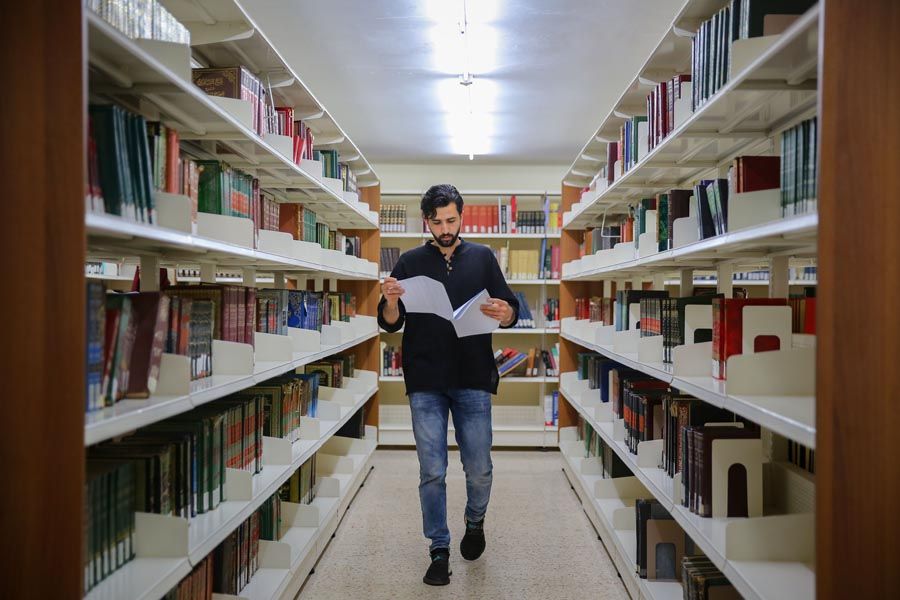
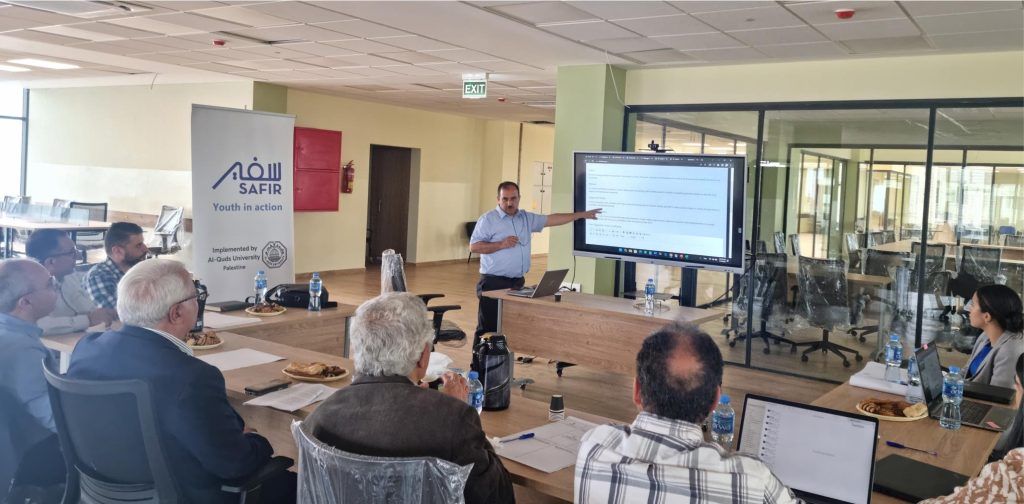
1. Advanced state-of-the-art learning and teaching programs
1.1 Develop a new pedagogy emphasizing active learning, critical thinking, and problem solving.
1.2 Increase the use of technology-enhanced learning across programs.
1.3 Strengthen the qualifications and professional development of program instructors. 1.4 Create a learning analytics system to track student progress and provide personalized feedback.
2. Empower students and staff›s global competitiveness
2.1 Expand the university’s global footprint through the development and delivery of
new internationalized courses and programs.
2.2 Increase the internationalization of the university’s student body and faculty. 2.3 Enhance opportunities for students and staff to gain international experience through studying abroad, internships, and other forms of international engagement. 2.4 Implement programs to develop language skills, cultural understanding, cultural competency, and global awareness.
3. Forefront world-class research and academic excellence
3.1 Support the enhancement of university academic staff and researchers as recognized leaders in their fields.
3.2 Benchmark competitive research that elevates the University’s global research im pact.
3.3 Empower research commercialization and patenting.
3.4 Encourage students’ pursuit of postgraduate studies and high-tech careers
4. Foster critical thought, forward-thinking innovation, and entrepreneurship
4.1 Strengthen the University’s culture of entrepreneurship, design thinking, and innovation.
4.2 Support startup development, upscaling, and the student-entrepreneur mindset.
4.3 Encourage the internationalization of university startups through their participation in competitions, and events, among others.
5. Sustain financial stability and institutional efficiency within the university environment
5.1 Boost the University’s endowment funds in support of financial sustainability.
5.2 Optimize the University’s operational costs.
5.3 Strengthen the University’s financial management practices.
5.4 Ameliorate the University’s efficiency in delivering services.
5.5 Scale up the University’s fundraising capabilities.
6. Catalyze a culture of social responsibility and sustainability.
6.1 Increase the University community engagement in social responsibility initiatives.
6.2 Enhance the University›s environmental sustainability. 6.3 Bolster the sustainability of the University’s operations.
6.4 Raise awareness among the University community about social responsibility and sustainability.
7. Mobilize interdisciplinary cooperation and cultivate enduring global partnerships.
7.1 Create new interdisciplinary research centers and initiatives.
7.2 Increase the number of faculty and students who participate in interdisciplinary research.
7.3 Establish new global partnerships with universities and research institutions around the world.
7.4 Augment the number of students and faculty who participate in international cooperation initiatives.
| Strategic Goals | Strategic Objectives | Key Performance Indicators (KPIs) |
| Advance state-of-the-art learning and teaching | 1.1 Develop a new pedagogy emphasizing active learning, critical thinking, and problemsolving. |
|
| 1.2 Increase the use of technology-enhanced learning across programs |
|
|
| 1.3 Strengthen the qualifications and professional development of program instructors. |
|
|
| 1.4 Create a learning analytics system to track student progress and provide personalized feedback. |
|
|
| Empower students and staff’s global competitiveness | 2.1 Expand the university’s global footprint through the development and delivery of new internationalized courses and programs. |
|
| 2.2 Increase the internationalization of the university’s student body and faculty. |
|
|
| 2.3 Provide more opportunities for students and staff to gain international experience through study abroad, internships, and other forms of international engagement. |
|
|
| 2.4 Implement programs to develop language skills, cultural understanding, cultural competency, and global awareness. |
|
|
| Promote a forefront world-class research and academic excellence | 3.1 Support the enhancement of University academic staff and researchers as recognized leaders in their fields. |
|
| 3.2 Benchmark competitive research that elevates the University’s global research impact. |
|
|
| 3.3 Empower research commercialization and patenting. |
|
|
| 3.4 Encourage students’ pursuit of postgraduate studies and high-tech careers. |
|
|
| Foster critical thought, forward-thinking innovation, and entrepreneurship | 4.1 Strengthen the University’s culture of entrepreneurship, design thinking, and innovation. |
|
| 4.2 Support startup development, upscaling, and the student-entrepreneur mindset. |
|
|
| 4.3 Encourage the internationalization of university startups through their participation in competitions, events, among others. |
|
|
|
Sustain financial stability and institutional efficiency within the university environment |
5.1 Boost the University’s endowment funds in support of financial sustainability. |
|
| 5.2 Optimize the University’s operational costs. |
|
|
| 5.3 Strengthen the University’s financial management practices. |
|
|
| 5.4 Ameliorate the University’s efficiency in delivering services. |
|
|
| 5.5 Scale up the University’s fundraising capabilities. |
|
|
| Catalyze a culture of social responsibility and sustainability | 6.1 Increase the University community engagement in social responsibility initiatives. |
|
| 6.2 Enhance the University’s environmental sustainability. |
|
|
| 6.3 Bolster the sustainability of the University’s operations. |
|
|
| 6.4 Raise awareness among the University community about social responsibility and sustainability. |
|
|
| Mobilize interdisciplinary cooperation and cultivate enduring global partnerships. | 7.1 Create new interdisciplinary research centers and initiatives. |
|
| 7.2 Increase the number of faculty and students who participate in interdisciplinary research. |
|
|
| 7.3 Establish new global partnerships with universities and research institutions around the world. |
|
|
| 7.4 Augment the number of students and faculty who participate in international cooperation initiatives. |
|
The Strategy Development Committee seeks to acknowledge all professors, faculty members, students, and stakeholders who participated in the development of the University Strategy, and generously provided us with their time, effort, expertise, and input.
The University’s strategy has been formally acknowledged and endorsed by the Board of Trustees during its meeting No. 99G-2-2024 on 19 February 2024, ensuring alignment with our institutional goals and values.
Dr. Munib Rashid Al-Masri
Mrs. Maha Subhi Abu Sushi
Dr. Hiba Ibrahim Al-Hussein
Mr. Michel Sayegh
Dr. Sameer Mahmoud Tamimi
Dr. Anees Ahmad Al-Qaq
Mr. Omar Munib Al-Masr
Mr. Farouk Alshami
Dr. Ghazi Hanna Hanania
Eng. Mazin Sinokrot
Dr. Tafida Husneh Jarbawi
Mr. Ibrahim Jafal
Dr. Mohamad Ali Al-Alami
Eng. Khaled Osaily
Eng. Hani Mohammad Abu Diab
Prof. Imad Fayq Abu Kishek